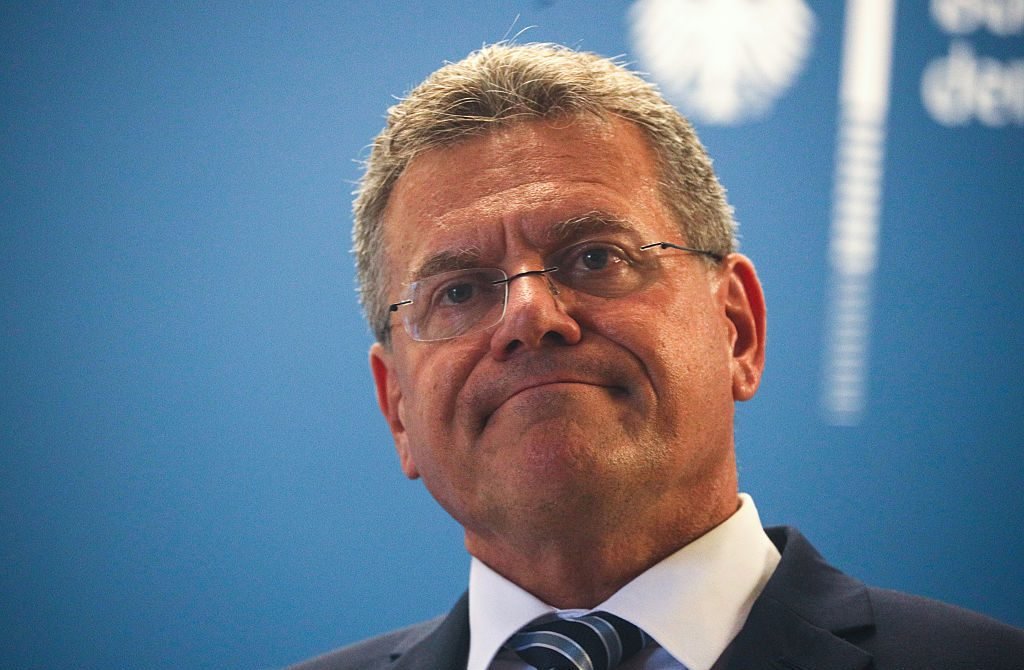Donald Trump’s tariffs on European car and steel exports are “unsustainable” and have exacerbated the “bleeding” of Europe’s auto sector, EU trade commissioner Maroš Šefčovič said on Monday.
The remarks come amid reports – officially denied by Brussels – that the EU could accept the US president’s 10% baseline tariff on most European exports in order to avoid sector-specific import taxes.
Trump has imposed 50% duties on steel and aluminium and 25% levies on cars and car parts since his return to the White House this year. He has also threatened further ‘sectoral’ duties on pharmaceuticals, semiconductors, and lumber.
“Especially these sectoral tariffs are unsustainable, because if you look at the car industry of Europe, it’s clearly bleeding,” Šefčovič said at an event in Berlin by the Federation of German Industries (BDI), a lobby group.
Trump’s tariffs have compounded the woes of Germany’s flagship auto sector, which is already reeling from a combination of slowing demand and increasingly fierce Chinese competition.
The US is Germany’s top auto export destination, with 450,000 vehicles valued at $24.8 billion (€21.5 billion) sent across the Atlantic last year, according to the US Deparment of Commerce.
Šefčovič’s remarks also come amid increasingly frantic efforts by EU officials to strike a deal with Washington before July 9, when a 50% blanket US tariff on European goods is set to enter into force.
Could EU strike a UK-style ‘deal’?
The veteran commissioner also suggested that a EU-US trade agreement could resemble the UK-US deal struck last month – the only announced agreement since Trump’s return to the White House in January.
The deal – which has been fiercely criticised by EU ministers – provides tariff exemptions for British metal and cars but leaves the 10% blanket duty in place.
“I think that, so far, there was only one agreement agreed upon – so that’s, I think, the only one from which we can kind of deduce, what would be the pattern of” any EU-US trade deal, Šefčovič said.
Such a deal would therefore include a “brief agreement on principles, or [a] framework agreement with stated goals”, followed by agreements “on the different sectoral issues”, he said.
Šefčovič, however, noted that he had failed to persuade his American counterparts that the EU’s trade surplus in goods with the US is mostly offset by the bloc’s deficit in services.
The EU ran a surplus in goods of €198 billion with the US last year but a deficit in services of €148 billion in 2024, according to EU data.
“Our American friends, they do not want to kind of, put it into the equation between trade in goods and services,” he said, adding that major US tech firms currently generate “30% to 50%” of their revenue in the EU but that “most” of these funds are not taxed.
In a thinly veiled reference to China, Šefčovič also reiterated that the EU and the US had a “common interest” in addressing “bottlenecks” in the global supply of critical raw materials and semiconductors as well as steel “overcapacities”.
China produces well over half of the world’s steel and refines 92% of so-called “rare earths” that are used to manufacture smartphones, electric vehicles, and other advanced technologies.
More than half of the world’s semiconductors are also manufactured in Taiwan, a self-governing island that China claims as part of its territory.
Trump’s tariffs currently affect €370 billion worth of EU exports to the US. The EU, meanwhile, has threatened to retaliate in two separate packages targeting €21 billion and €95 billion worth of goods, if no “mutually acceptable” deal is reached.
The former package, which targets US soybeans, diamonds, and motorbikes, is set to enter into force on 14 July – five days after Trump’s 50% levy on EU goods is scheduled to kick in. The second is still being prepared.
(om)




